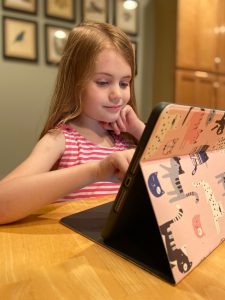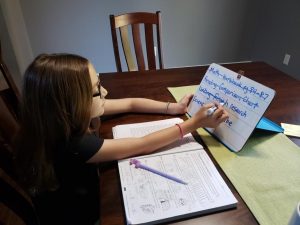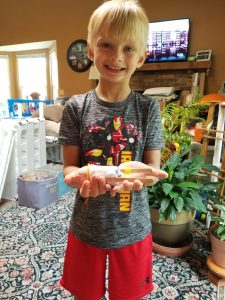As your family settles into remote and hybrid learning, try these tips from library staff and teen volunteers to make the most of an unusual school year.
1. Establish a Routine

Daily routines establish stability, consistency, and a sense of caring. Clear transitions between activities help young children progress through the day.
Youth Services Assistant Brienne and her kindergartener Violet made a schedule to stay on track. Every week day, Violet knew she would work on assignments from her teacher from 8 to 10 a.m., play outside with her mom for an hour, and then have lunch. In the afternoon, Violet enjoyed free time while Brienne took care of work tasks, and sometimes Violet helped out with Art Online.
2. Plan Ahead
 Learning from home is a great opportunity to practice time management skills. Check-in regularly with teachers and use a calendar to keep schoolwork from piling up and becoming overwhelming, an article from Medium suggests.
Learning from home is a great opportunity to practice time management skills. Check-in regularly with teachers and use a calendar to keep schoolwork from piling up and becoming overwhelming, an article from Medium suggests.
Every Monday, Youth Services Librarian Grace helped her daughter Ellie make a list of all the assignments she needed to complete that week. Ellie chose which assignments to work on each day as long as they were all finished by Friday.
Teen volunteers Emma and Camille both planned out their days, too. Emma worked on her assignments in the same order that she usually had classes so she wouldn’t forget anything, and Camille used a calendar to finish one to two assignments for each class, each day. Camille’s planning means she sometimes enjoyed a three- or four-day weekend!
3. Keep Motivated
 Children have short attention spans. Research shows at most, a 6-year-old can focus for up to 18 minutes, a 10-year-old for up to 30 minutes, and a 16-year-old for up to 48 minutes. By breaking up the school day with activities and rewards, their attention will actually improve when it comes time to sit down and focus on school.
Children have short attention spans. Research shows at most, a 6-year-old can focus for up to 18 minutes, a 10-year-old for up to 30 minutes, and a 16-year-old for up to 48 minutes. By breaking up the school day with activities and rewards, their attention will actually improve when it comes time to sit down and focus on school.
Customer Service Assistant Nancy’s son Braxton struggled to spend all day learning virtually, so she split up the time with offline rewards. After each finished assignment, he went outside or played a game. Even though it extended the school day a bit longer, Braxton focused better on his assignments.
GoNoodle has lots of energy break ideas including exercise, mindfulness, and creative activities.
4. Stay Engaged
Actively participating in class discussions helps students focus and understand the material, and that’s still true when the discussion is held on Google Meet. Check out Princeton University’s tips for when you’re not sure what to add to the conversation.
Volunteer Sophie says she made sure to ask questions during class video chats and to pay attention to other students’ questions since the answers usually helped her out too. She also set up a one-on-one video conference with her choir teacher to get some extra help.
5. Do Something You Enjoy
 Social isolation and disrupted routines significantly impact our mental health, especially for teens. Taking care of the mind and body can help.
Social isolation and disrupted routines significantly impact our mental health, especially for teens. Taking care of the mind and body can help.
Volunteer Katherine taught herself embroidery and scrapbooking. She also mixed up her exercise routine with new stretches and trying new routes when she walked, ran, and biked. Camille kept busy with cooking, exercise, and DIY clothing activities as well as lots of reading and writing.
Younger kids can visit our YouTube channel and blog for crafts and activities, while teens can explore CreativeBug or join our next live crafting class to learn something new!
6. Find Your Community
With limited in-person interactions, it’s important to remember you are not in this alone. If you haven’t found an extended support system yet, we highly recommend it. Connecting with your community can help reduce the stress caused by the pandemic.
Our teen volunteers have found lots of great ways to stay connected with their friends; setting up hammocks in the park, gathering outside to sing happy birthday, taking socially distanced walks together, helping each other with homework, playing Xbox Live, and video chatting over FaceTime or Zoom.
Final Thoughts
It’s been a challenging year thus but, hopefully, summer provided time to settle in and plan for the return to school. Take care of yourselves, and visit the Homework Help Center online for more academic resources!


